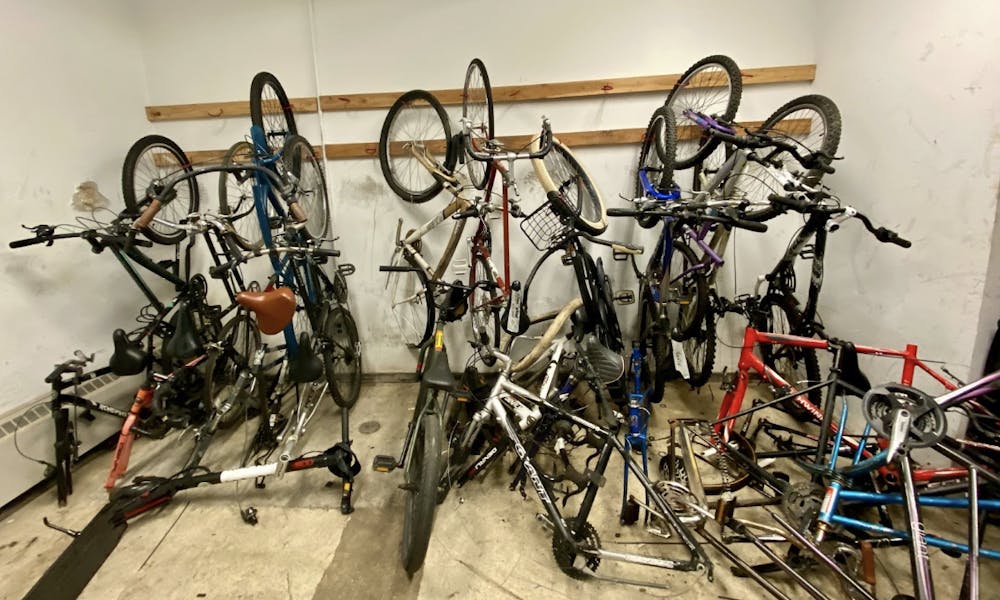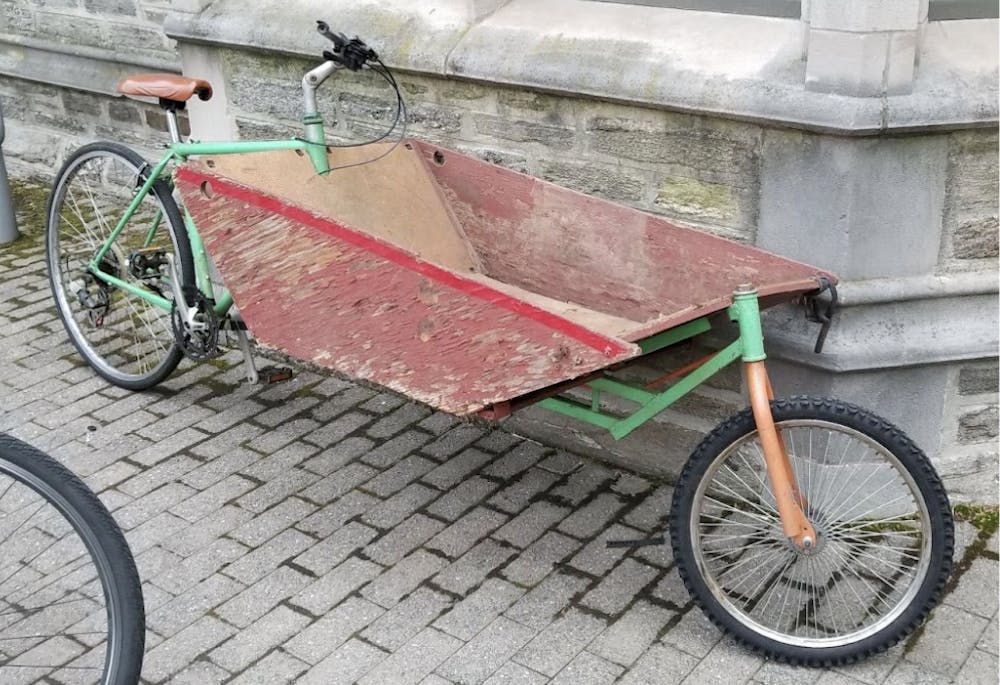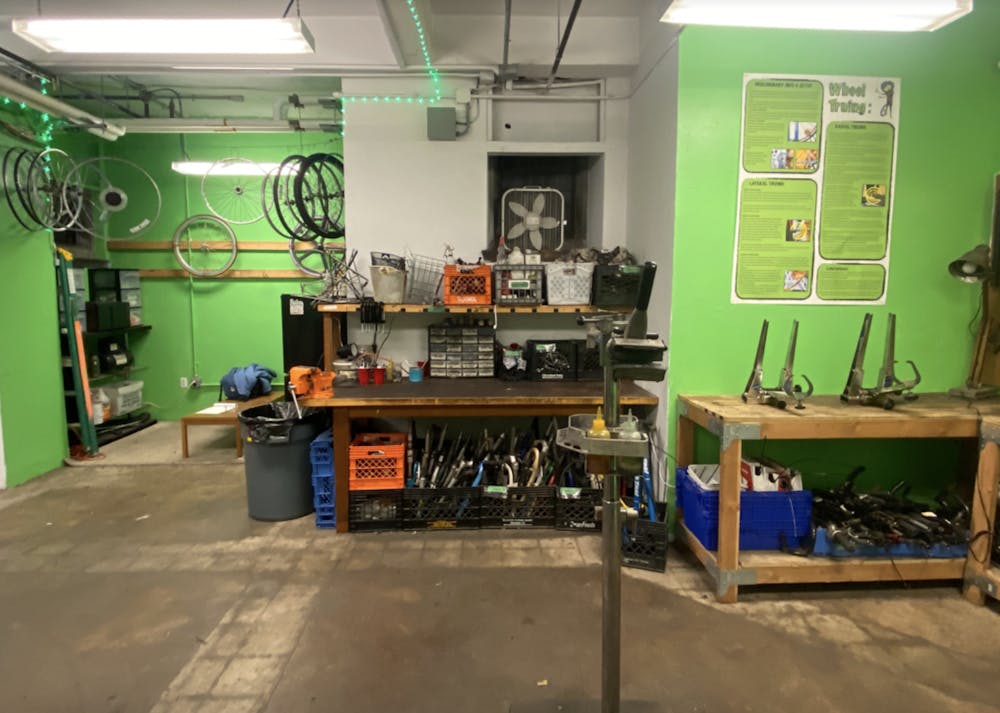The summer before his first year at Princeton, Samuel Kleiner ’25 bought a $75 bike from Facebook Marketplace. After a week on campus, it broke down — the back axle snapped, and the gear shifter caught in the spokes.
Looking to salvage his bike, Kleiner visited Cyclab, the student-run bicycle co-op in the basement of Rockefeller (“Rocky”) College. However, each fix revealed a new problem, and week after week, Kleiner found himself puzzling through repairs alongside student mechanics.
“It was many, many hours of figuring it out by trial and error,” Kleiner told The Daily Princetonian. “That’s one good thing about Cyclab: it’s a space where you can mess up.”
Now, Kleiner and Nicholas McAdam ’25 serve as co-managers of Cyclab, a workshop that embraces the entropy of a perfectionist campus. While a professional mechanic might order a new part to make a repair, Cyclab — bound by its student-organization budget and its principle of sustainability — opts to work with what it has: an array of recycled parts, ranging from spoke caps to rims to entire frames.
“It’s very easy to get caught up in campus life here and compare your grades or what fashion you're wearing,” McAdam said, who comes from a farming background in South Africa. “There are very few places like Cyclab, where you can get your hands dirty and work with grease.”
For mechanic Ian Grimm ’25, who repaired bikes at Dick’s Sporting Goods during his gap year, working as a Cyclab mechanic is a way to “make something meaningful.”
“There's a culture of ‘nothing is too is too broken to not try to fix,’” Grimm said.
‘Everyone teaches everyone’

On a Tuesday evening in November, Grimm and Gil Joseph ’25 worked on Joseph’s black Schwinn Gateway. The splash guard, the piece that prevents mud from splashing, was loose, keeping the wheel from turning smoothly.
Together, the two devised an unconventional solution: the splash guard could be pulled away from the wheel if it was held in place by plastic zip ties.
Joseph described Cyclab’s unique culture of collaboration. “I worked in a bike shop before, but here, it’s about bouncing ideas off each other,” he said.
The interactions between mechanics and clients are key to Cyclab’s mission. Mechanics don’t just make repairs, but they also show students how to fix their own bikes. However, the learning often goes both ways.

“One of the joys of the space is that oftentimes, the staff are quite novice and the people that come in actually have some decent experience,” said Oswald Stocker ’21 GS ’22, who served as manager last year. “You’ll get customers teaching staff. Everyone teaches everyone.”
In fact, mechanics aren’t required to have a prior background in bike repair.
“If you want to work at Cyclab,” McAdam said, “the only thing we do require is that you’re committed to showing up to your shift. Anything else will be taught within the space.”
As a result, the staff holds a range of experiences. While Kleiner learned the fundamentals of repair by fixing his own bike as a first-year, Stocker spent a gap year in a professional bike workshop. The staff is also diverse in terms of academics, nationality, and involvement on campus, according to McAdam.
“It’s very much a space where people would not necessarily have interacted with each other beforehand,” McAdam said, “but it’s an environment where you can just be present and be who you are.”
Given the universal tendency for bikes to break down, Cyclab clients range from first-years, to Ph.D. students, to staff.
“Strangers would come in, and you fix their bikes,” Stocker told the ‘Prince.’ “They’re standing right there next to you, so it’s a perfect opportunity to have a chat.”
“I was on a sports team and was in an eating club and all that,” Stocker added, “but Cyclab was my favorite social setting at Princeton.”
Building ‘Frankenstein bikes’
Before the COVID-19 pandemic, the University Department of Public Safety collected bikes left on campus and delivered them to Cyclab.
The mechanics sometimes refurbished those in better condition for donation. In past years, the co-op has supplied bikes to Princeton Mutual Aid. But many other bikes faced a different fate.
“We ask ourselves, ‘how much of this stuff can we scrap?’” Grimm explained. “Can we take off some derailleurs? Can we use these chains? What parts of the bike are still worthy of putting into something new?”
In the back room of the shop, partially disassembled bikes — ranging from sturdy mountain bikes to low-to-the-ground BMX bikes — hang off the wall and lie piled on the ground. Their derailleurs, chains, wheels, and brakes are in the bank of parts that can serve as free replacements for clients.
According to Grimm, matching recycled parts to new bikes tends “to be a puzzle, but that’s part of the fun.”

Molly Taylor / The Daily Princetonian
Recycled parts, though, don’t always hold the perfect solution.
“If someone comes in and there’s a part of their bike that’s broken, and we go ‘Oh, we have a whole drawer of these,’ and you open the drawer, and 90 percent of the parts in the drawer are also broken,” Stocker said.
Despite the challenge of using recycled parts, Dak Cheng ’25 said he has looked to leverage Cyclab’s stockpile. When his family drove to campus for move-in, the avid cyclist said he wasn’t able to fit a bike in the car.
“So I came here, and I’m like, ‘You know what, let’s build myself a bike,’” Cheng said.
The first bike Cheng built at Cyclab used a white Lapierre frame that he discovered in the trash and everything else — the chains, derailleurs, wheels — also came from recycled bikes. He secured a cardboard box over the back wheel to carry to-go containers from the dining halls.
When the bike was stolen, though, Cheng started a new project.
“I’d noticed a bucket in the corner of Cyclab — it was just a big, ugly wooden thing,” Cheng said. “I hadn’t really paid attention to it until it hit me one day: that thing could be a cargo bike. This is gold.”

Photo courtesy of Dak Cheng ’25
Cheng refurbished the cargo bike, with its wheelbarrow-like bucket and long frame, and now it’s his “daily driver” to get over to the engineering quad and down campus for his music classes. The bucket was particularly helpful to Cheng when he moved his suitcases to COVID-19 isolation housing last year. Other times, he said, it’s good for “joking around, carrying people.”
In total, Cheng said he has worked on seven bikes at Cyclab for himself, his roommates, and other friends.
“It’s a whole Frankenstein bike situation,” Cheng said. “I usually just work with what I have, and get it to something that I would ride — that’s my standard.”
Forward momentum
As Cyclab approaches its tenth year in Rocky College, its managers are looking to the future.
Cyclab originally operated out of 130 University Place, collaborating with U-Bikes to repair bikes that would be rented to students. When U-Bikes went for-profit with Princeton Student Agencies and 130 University Place closed in 2012, Cyclab shut down. It reopened a year later in Rocky, which now sponsors the co-op, but closed during the 2020–21 academic year as a result of the pandemic.
Now, Kleiner and McAdam are working to reestablish partnerships with Public Safety and sustainability groups on campus, as well as non-profit organizations where Cyclab can, once again, donate refurbished bikes.
The co-managers have also invested in improving the shop itself.
“When I started working last year, we didn’t have half the tools we have now, and paint was falling off the walls,” McAdam said. At the beginning of this academic year, they repainted the walls lime green and organized their tools.
"We’ve worked really hard to make sure it’s a space that the workers can be proud of,” McAdam said.
Molly Taylor is a Features staff writer for the Daily Princetonian. Please direct corrections requests to corrections[at]dailyprincetonian.com.








